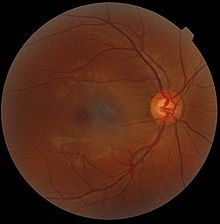 Research shows that fading vision is part
Research shows that fading vision is part
of the anorexia experience.
Anorexia deteriorates the body like a fast-forward of the aging process. We now know that 17-year-old girls with severe anorexia can have the fragile bones of what used to be considered a symptom of old age: osteoporosis. What my physiology professor at UCLA called "over forty eyes" when he reached for his reading glasses is becoming noticeable in women of all ages who starve. How is your vision lately?
Anorexia Eye Damage Study
A small study of 33 women, with an average age of 28, compared 13 women who were anorexic for an average of 10 years with 20 healthy women, measuring electrical activity and thickness of the macula. (Isn't the ophthalmogram lovely? It shows the macula as a spot to the left. The optic disc is the area on the right where blood vessels converge.)
(I had a patient suffering from macular degeneration. It was progressive and resulted in blindness. She was in her mid-fifties and had no history of anorexia. This medical condition, usually associated with older adults, may need to be redefined to include an association with anorexia nervosa.)
The article in Science Daily includes this description of the study:
"The tests to determine how well the eyes picked up fine detail, central vision, and colour showed that there were no obvious visual problems and that the eyes were working normally in both sets of women. But, the analysis showed that the macula and the nerve layers feeding it (retinal nerve fiber layer) were significantly thinner in the eyes of the women with anorexia nervosa.
"There was also significantly less firing of the neurotransmitter dopamine (electrical activity) in the eyes of the women with anorexia nervosa. Dopamine neurotransmission is a key element of the brain's ability to process visual images. There even seemed to be differences between women with different patterns of anorexia.
"The fovea -- a small pit more or less at the centre of the macula that is rich in light-sensitive cone cells (photoreceptors) -- was thinner in those women who binged and purged than in those who simply severely restricted their calorie intake.
"The authors conclude that it is not yet clear whether macular thinning and decreased neurotransmitter activity are the initial stages of progressive blindness or whether these signs will revert back to normal once normal eating patterns are resumed."
My Routine
For at least ten years, as a matter of routine, I have asked new clients and people who call for treatment information to get a medical check-up that includes a bone density test. The purpose of the bone density test is to discover if osteoporosis exists (it doesn't hurt) and to get a baseline. With a record of a baseline, future tests will show if osteoporosis is developing.
Now I will add to my routine, my request that new clients and callers see an ophthalmologist and get a macula checkup for the same reasons: detection of a problem (it doesn't hurt) and baseline to notice any deterioration in the future.
- Do you need stronger light to read clearly?
- Do your eyes get tired?
- Do you suffer from headaches that could be caused by eye strain?
- Do you get "bored" or "impatient" and put your reading down after a few minutes?
- Do you read better in the sunlight than indoors?
- Do you struggle with menus?
- Are traffic signs more difficult to read when you are driving?
Please get your eyes checked. Never doubt that high-quality bones and eyes will contribute greatly to the quality of your life.
P.S. I was inspired to write this article because my book, Healing Your Hungry Heart: Recovering from Your Eating Disorder, just came out in a hardback, large print version through Thorndike Press. A few readers with a history of anorexia wrote to me expressing their gratitude for the large print because their vision was deteriorating.
Story Source: Materials provided by BMJ-British Medical Journal via EurekAlert!, a service of AAAS.
Journal Reference:
- Marilita M Moschos, Fragiskos Gonidakis, Eleftheria Varsou, Ioannis Markopoulos, Alexandros Rouvas, Ioannis Ladas, George N Papadimitriou. Anatomical and functional impairment of the retina and optic nerve in patients with anorexia nervosa without vision loss. British Journal of Ophthalmology, 2010; DOI: 10.1136/bjo.2009.177899
Articles:
Eating Disorders and Their Impact on the Eyes
Please share your thoughts in the comment section below.
Written by Joanna Poppink, MFT. Joanna is a psychotherapist in private practice specializing in eating disorder recovery, stress, PTSD, and adult development.
She is licensed in CA, AZ, OR, FL, and UT. Author of the Book: Healing Your Hungry Heart: Recovering from Your Eating Disorder
Appointments are virtual.
For a free telephone consultation, e-mail her at


Add comment